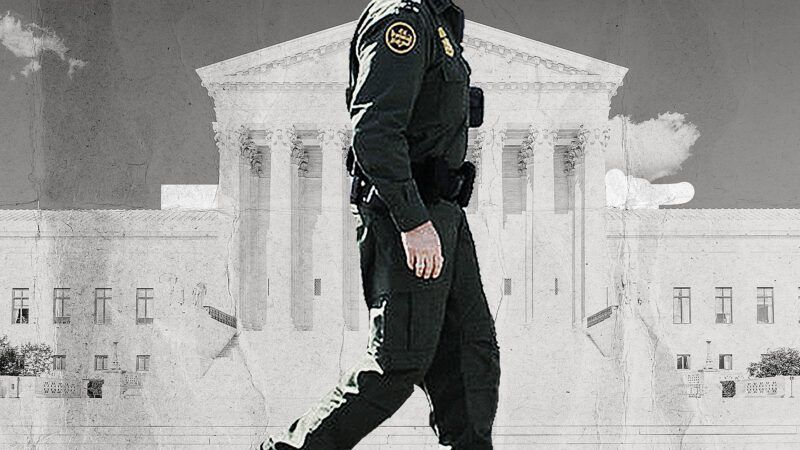Border Patrol Agent Wants SCOTUS To Make It Effectively Impossible To Sue Abusive Federal Officers
A precedent allowing federal officers to be held civilly liable for constitutional rights violations has come under fire.

In Bivens v. Six Unknown Named Agents of the Federal Bureau of Narcotics (1971), the U.S. Supreme Court held that federal officers can be held civilly liable—sued—for conduct that violates constitutional rights. In a recent legal filing, a federal Border Patrol agent asked the Court to "reconsider Bivens" and make it effectively impossible to sue rogue federal officers over their rights-violating conduct. To make matters worse, some members of the Supreme Court might be willing to take the agent up on the offer.
The case is Egbert v. Boule. Robert Boule owns a bed-and-breakfast in Washington state near the U.S.-Canadian border. Border Patrol agent Erik Egbert wanted to question one of Boule's guests, a Turkish national, about his immigration status. Boule asked the agent to leave his property but Egbert refused. Egbert then allegedly shoved Boule against a car and pushed him to the ground, injuring Boule's back. Boule later complained to Egbert's superiors about this mistreatment. In retaliation for that complaint, the agent asked the IRS to investigate Boule's tax status. Boule was audited.
Boule filed a Bivens complaint against Egbert, suing the agent in federal court for violating his rights under both the First Amendment (for retaliating against Boule's lawful speech complaining about the agent's conduct) and the Fourth Amendment (for refusing to leave Boule's property and using force against him).
Boule prevailed at the U.S. Court of Appeals for the 9th Circuit, which said that any hesitancy about letting this lawsuit move forward in federal court is "outweighed by compelling interests in favor of protecting United States citizens from unlawful activity by federal agents within the United States."
Egbert and his lawyers now want the Supreme Court to overturn that 9th Circuit decision in the name of greater judicial deference toward federal law enforcement. This case, they argue in a petition seeking review, "arises in a setting raising exceptionally sensitive questions about whether recognizing Bivens actions will undercut the ability of Border Patrol agents to fulfill their basic mission of securing the border, enforcing the immigration laws, and protecting national security."
The Bivens precedent has its critics on the High Court and this petition is directed squarely at them. Justice Clarence Thomas, for example, has argued that "the analysis underlying Bivens cannot be defended." Thomas thinks Bivens went wrong because the federal courts have no business recognizing such federal causes for action absent a congressional statute.
But Thomas sells Bivens short. As I have previously argued, "the idea that federal judges have the authority to impose damages against lawless federal officers is as old as the republic—older, in fact, since it comes from venerable British common law judgments that directly influenced the founding generation."
Rather than eliminate Bivens, as this allegedly abusive federal agent wants, the Supreme Court should strengthen the precedent so that even more victims of rights-violating federal officers can get their respective days in court.

Show Comments (35)